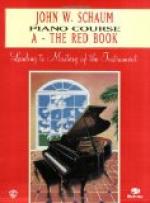“An ancient and famous philosopher, Seneca, is said to have remarked that by the time a man reaches the age of twenty-five, he should know enough to be his own physician, or he is a fool. We might apply this idea to the pianist. After studying the piano for a number of years he should be able to discover what sort of technical exercises are most beneficial; if he cannot do so he must be a fool. Why should he always depend on the exercises made by others? There is no end to the list of method books and technical forms; their name is legion. They are usually made by persons who invent exercises to fit their own hands; this does not necessarily mean that they will fit the hands of others. I encourage my pupils to invent their own technical exercises. They have often done so with considerable success, and find much more pleasure in them than in those made by others.
“Two of the most important principles in piano playing are: full, round, exact tone; distinct phrasing. The most common fault is indistinctness—slurring over or leaving out notes. Clearness in piano playing is absolutely essential. If an actor essays the role of Hamlet, he must first of all speak distinctly and make himself clearly understood; otherwise all his study and characterization are in vain. The pianist must likewise make himself understood; he therefore must enunciate clearly.
VELOCITY
“You speak of velocity as difficult for some players to acquire. I have found there is a general tendency to play everything too fast, to rush headlong through the piece, without taking time to make it clear and intelligible. When the piece is quite clear in tone and phrasing, it will not sound as fast as it really is, because all the parts are in just relation to each other. As an illustration of this fact, there is a little Gavotte of mine, which I had occasion to play several times in Paris. A lady, a very good pianist, got the piece, learned it, then came and asked me to hear her play it. She sat down to the piano, and rushed through the piece in a way that so distorted it I could hardly recognize it. When she finished I remonstrated, but she assured me that her tempo was exactly like mine as she had heard me play the piece three times. I knew my own tempo exactly and showed her that while it did not differ so greatly from hers, yet my playing sounded slower because notes and phrasing were all clear, and everything rightly balanced.
POWER
“How do I gain power? Power does not depend on the size of the hand or arm; for persons of quite small physique have enough of it to play with the necessary effect. Power is a nervous force, and of course demands that arms and wrists be relaxed. The fingers must be so trained as to be strong enough to stand up under this weight of arms and hands, and not give way. I repeat, the nail joint must remain firm under all circumstances. It is so easy to forget this; one must be looking after it all the time.




